Master Stock Markets
Explore essential techniques and insights for stock market success, from basics to advanced strategies.
What Is the Stock Market in India and How Does It Work?
Think of the stock market as a vibrant bazaar, but instead of selling clothes or food, it’s a place where parts of businesses—known as shares—are bought and sold. In India, the two main stock exchanges are the Bombay Stock Exchange (BSE) and the National Stock Exchange (NSE). These exchanges are platforms where investors and traders engage in buying and selling stocks of publicly listed companies.


what is a stock?
It represents a small piece of ownership in a company. When you purchase shares of a company like Reliance Industries or Tata Motors, you become a part-owner of that company, however tiny your share might be. Why do companies allow this? When a business wants to raise money for expansion, research, or paying off debts, it can issue shares to the public through an Initial Public Offering (IPO). Investors who buy these shares provide the company with the capital it needs, and in return, they get an opportunity to share in its profits and growth.


How Price changes?
The Indian stock market has its share of excitement and volatility. Stock prices are influenced by various factors, such as the company's performance, economic policies, global market trends, and investor sentiment. For instance, changes in interest rates by the Reserve Bank of India (RBI) or the announcement of a new government policy can send the markets soaring or plummeting.


Is it Good to Invest in
markets?
Investing in the stock market can be a way to grow wealth over time, but it comes with risks. You can make profits if the value of the shares you own increases, but there's also the possibility of losing money if prices fall. To manage these risks, it’s important to diversify your investments and have a clear understanding of your financial goals.


History of Stock Exchanges?
The history of Indian stock exchanges is a captivating journey that intertwines with the country’s economic and cultural evolution. It’s a story of ambition, growth, and the relentless spirit of investors.
The roots of India’s stock market can be traced back to the 19th century when the country was still under British rule. In the 1850s, a group of enterprising stockbrokers would gather under a banyan tree in front of Mumbai’s Town Hall to trade shares of East India Company. Over time, this informal setup gradually took a more organized shape, and in 1875, the Bombay Stock Exchange (BSE) was established. The BSE holds the distinction of being Asia’s oldest stock exchange, and its iconic headquarters at Dalal Street remains a bustling hub of financial activity.
In those early days, the stock market was quite different from what we know today. Trading was done in person, and the market was limited to a few well-connected traders and influential business families. Yet, the desire for growth was evident, and over time, the BSE became the cornerstone of India’s financial system, witnessing the economic highs and lows of colonial and post-independence India.




Inauguration of Stock market
Fast forward to the 1990s—a decade of radical change for India. Economic liberalization under then-Prime Minister P.V. Narasimha Rao and Finance Minister Dr. Manmohan Singh opened India’s doors to the global economy. This transformative era led to the establishment of the National Stock Exchange (NSE) in 1992. Unlike the BSE, which had a history steeped in tradition, the NSE was built to bring transparency, technology, and a more regulated approach to stock trading. It introduced a screen-based electronic trading system, which revolutionized how stocks were bought and sold in India.




Navigating the World of Global Stock Markets: A Beginner's Guide
Investing in the stock market can feel a bit like embarking on an international adventure—filled with excitement, risk, and endless opportunities. But before we dive into this world, let’s get to know the major stock markets across the globe. Each has its own personality, a set of rules, and a unique impact on the global economy.


Why Do Global Stock Markets Matter?
Think of the global economy as a tightly connected web, where each stock market plays a vital role. When something happens in one part of the world, it often sends ripples across others. For example, a new policy decision by the U.S. Federal Reserve can influence not only Wall Street but markets as far away as Tokyo or Mumbai. Understanding this interconnectedness can help investors make smarter, more informed decisions.


Meet the Major Players
Let’s take a virtual trip around the world and meet some of the most influential stock markets.
New York Stock Exchange (NYSE) and NASDAQ – USA
These two markets are like the twin giants of Wall Street, where companies like Apple, Amazon, and Tesla are traded. The NYSE is known for being a symbol of stability and tradition, while the NASDAQ is home to tech innovators. Together, they make the United States the powerhouse of global finance.


2. Tokyo Stock Exchange (TSE) – Japan
In the Land of the Rising Sun, the TSE stands tall. With companies like Toyota and Sony, this market is a window into the health of Asia’s second-largest economy. It’s a reminder that Japan is still a major player in the world of technology and innovation.


Shanghai and Shenzhen Stock Exchanges – China
China’s economic engine is impossible to ignore. The Shanghai Stock Exchange (SSE) hosts many state-owned enterprises, while Shenzhen focuses on tech and startups. These markets are a reflection of China’s rapid transformation from a manufacturing hub to a global leader in tech and finance
4. Hong Kong Stock Exchange (HKEX) – Hong Kong
Think of Hong Kong as the gateway between China and the rest of the world. The HKEX has long been a favorite for international investors looking for exposure to Chinese companies. It’s a dynamic market that constantly adapts to global trends.
London Stock Exchange (LSE) – UK
Despite the ups and downs of Brexit, the London Stock Exchange remains a critical player in Europe. It’s home to giants like BP and HSBC and is a key hub for global trade and finance.
Euronext – Europe
Euronext operates in multiple European cities, including Amsterdam and Paris. It’s like the United Nations of stock exchanges, bringing together markets from different countries under one roof. If you want exposure to the European economy, Euronext is your go-to.
Bombay Stock Exchange (BSE) and National Stock Exchange (NSE) – India
India’s stock markets are buzzing with activity, reflecting the country’s rapid economic growth. The BSE is one of the oldest stock exchanges in Asia, while the NSE is the more modern sibling. With companies like Tata and Reliance, these markets are a gateway to the world’s fifth-largest economy.












Disclaimer: The financial information provided in this blog is for informational and educational purposes only and should not be considered as financial advice. While every effort has been made to ensure the accuracy of the data, global stock markets are subject to rapid changes, and information may become outdated or inaccurate. Readers should perform their own research or consult with a qualified financial advisor before making any investment decisions. The blog does not guarantee any specific outcomes and is not responsible for any financial losses that may result from the use of this information. Additionally, market regulations and financial practices vary by country, so investors should familiarize themselves with local laws and guidelines before engaging in international investments.
Why Should You Care?
You might be wondering: “Why does this matter to me?” Well, the performance of global stock markets affects everyone, whether you’re an investor or not. For example, a slowdown in China’s economy can impact the prices of goods worldwide. Or if Wall Street has a rough day, your investment portfolio might feel the hit.
Even if you’re not investing directly, understanding these markets can help you make sense of global news and how it impacts your day-to-day life.


Global Trends to Watch
Technology and Innovation: The NASDAQ is a prime example of how technology shapes markets. Keep an eye on advancements like artificial intelligence and renewable energy, as these sectors are set to drive future growth.
Geopolitical Events: Trade wars, elections, and even global health crises have ripple effects. The 2020 pandemic was a stark reminder of how interconnected our world is.
Sustainability: As climate change becomes a pressing issue, more markets are focusing on environmentally sustainable companies. This trend isn’t just ethical; it’s becoming financially significant.
Wrapping Up: Investing in a Globalized World
Investing globally isn’t just about numbers; it’s about understanding cultures, economies, and the world’s shifting power dynamics. Sure, it can be complex, but it’s also endlessly fascinating. Even if you’re just a curious observer or someone starting to build an investment portfolio, keeping an eye on global markets can provide insights into where the world is heading.
So, next time you hear about the “market,” remember there’s a whole world out there, and each exchange has a story to tell. Happy investing, or at the very least, happy learning!
🏛️ What Are Securities?
First, the basics: securities are just financial instruments that hold some kind of monetary value. Think of them as investment tools that you can buy, sell, and trade.
These are the main types of securities you’ll come across as an investor:


Stocks-Owning a slice of company
🎯


Imagine your favorite pizza place is doing so well that they decide to raise money by offering “slices” of ownership to the public. That’s kind of what stocks are.
👉 Stock = Ownership in a company
When you buy a stock, you're buying a share — literally a piece of that company. If the company grows, the value of your share grows too. Sometimes, they even share profits with you in the form of dividends.
Why people love stocks:
High growth potential 💹
Easy to buy and sell
You get voting rights in some cases
But be careful:
Stock prices go up and down — sometimes a lot
No guaranteed returns
🎯Bonds – The Safe Loan to Big Players

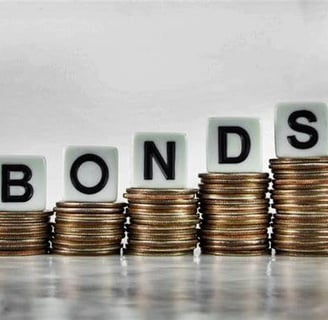
Let’s say your friend needs ₹10,000 and promises to return it with interest in 1 year. That’s a loan, right? Bonds work the same way — but on a much larger scale.
👉 Bond = Lending money to a company or government
In return, you get:
Fixed interest (called a coupon) at regular intervals
Your original amount (principal) back at the end
Why people like bonds:
Safer than stocks
Steady, predictable income
Great for long-term stability
But remember:
Lower returns than stocks
Prices can still go up/down if interest rates change
🎯Mutual Funds – Teamwork Makes the Dream Work


What if you and 100 other people pool your money, and a smart financial expert invests it for you? That’s exactly what a mutual fund does.
👉 Mutual Fund = A basket of investments managed by a pro
It can include stocks, bonds, or a mix of both. You don’t need to pick individual stocks — the fund manager does it for you.
Why mutual funds rock:
Diversified (so less risk)
Professional management
Great for beginners
But think about this:
Management fees can eat into your profits
You don’t have control over what’s bought/sold
🎯 ETFs – Mutual Funds That Trade Like Stocks


ETFs (Exchange-Traded Funds) are like the cooler, more flexible cousin of mutual funds.
👉 ETF = A basket of securities that you can buy/sell like a stock
They usually follow an index like the Nifty 50 or Sensex, and you can trade them throughout the day — just like regular stocks.
Why people love ETFs:
Lower fees than mutual funds
Super flexible
Great for building a long-term portfolio
Heads-up though:
You still need to understand what’s inside the ETF
Some have low trading volume
If you're just stepping into the world of investing, knowing what you're investing in is the first step to making smart money decisions.
You don’t have to master everything in one day — just keep learning, bit by bit.
➡️ Next time you hear someone say, “I’m investing in ETFs,” you won’t nod blindly — you’ll actually know what they mean.
Got a question? Leave a comment or reach out — let’s simplify finance together!
🏛️ Primary vs Secondary Market Explained – Where Stocks Are Born and Traded
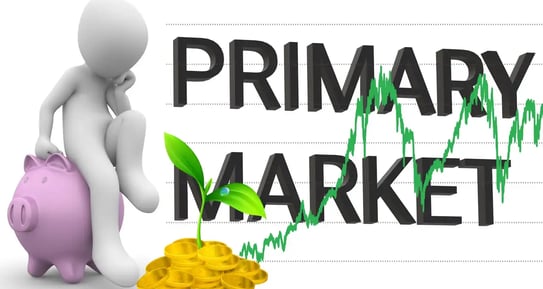

🎉 What is the Primary Market?
Think of the primary market as a birthplace for new stocks. This is where companies come to raise money for the first time by selling shares directly to investors.
📦 Example:
Let’s say a startup called SmartChai Ltd. wants to grow big — open 50 new tea outlets across India. They need money. So, they decide to raise funds from the public.
How? By offering shares through an IPO (Initial Public Offering).
You, me, or any retail investor can apply to buy shares during this IPO. If allotted, we get brand new shares — straight from the company.
👉 This whole process happens in the primary market.
🔑 Key Features of Primary Market:
Company issues shares for the first time
Investors buy directly from the company
Common through IPOs, FPOs (Follow-on Public Offers), rights issues, etc.
Helps companies raise capital
🔁 What is the Secondary Market?
Once the shares are issued, where do they go? Into the secondary market — where all the buying and selling among investors happens.
Think of the secondary market as a stock bazaar — a marketplace where existing shares are bought and sold between investors.
You’re not buying from the company anymore — you’re buying from another investor who wants to sell.
📦 Example:
You missed SmartChai Ltd.'s IPO, but you still want their stock. You can now buy it on NSE or BSE from someone who already owns it — that’s the secondary market.
🔑 Key Features of Secondary Market:
Shares already exist
Investors trade with each other
Happens through stock exchanges (like NSE, BSE)
Prices change constantly based on demand & supply


🚀 Why You Should Care
Understanding this difference helps you become a smart investor:
When a company launches an IPO, you’re getting in at the starting line.
When you buy in the secondary market, you’re reacting to what the market thinks the stock is worth.
Both markets matter — and both can be profitable if you know what you’re doing.
🏛️ How Does a Company Get Listed on the Stock Market?
Ever wondered how companies like Zomato, Nykaa, or Mamaearth end up getting listed on the stock market? One day you’re using their service, and the next — boom! You’re seeing headlines like “Zomato shares debut at ₹115!”
So, what’s really going on here?
Well, that’s what we’re diving into today. I’ll walk you through the entire process of how a company gets listed on a stock exchange, in plain English — no MBA needed.
Step 1: The Company Decides to Go Public
The journey begins when a private company decides to raise money from the public. This could be to expand, repay debt, or improve branding. By offering shares, they invite the public to become partial owners


Step 2: Hiring Financial & Legal Experts
The company can’t do this alone. They hire merchant bankers (investment banks), legal advisors, auditors, and registrars. These experts guide them through paperwork, valuation, promotion, and compliance.


Step 3: Drafting & Filing the DRHP with SEBI
Next, the company prepares a document called the Draft Red Herring Prospectus (DRHP) and submits it to SEBI. This includes financial statements, business plans, risks, and how the IPO funds will be used.


Step 4: Marketing the IPO (Roadshows)
To build excitement and trust, the company goes on a “roadshow” — presenting their business to potential investors, media, and analysts. These marketing efforts help gather interest before the IPO opens.


Step 5: Setting the Price Band & Opening for Bidding
After testing interest, the company announces a price band (e.g., ₹100–₹110). Investors place bids within this range during the IPO window — choosing how much they want to invest.
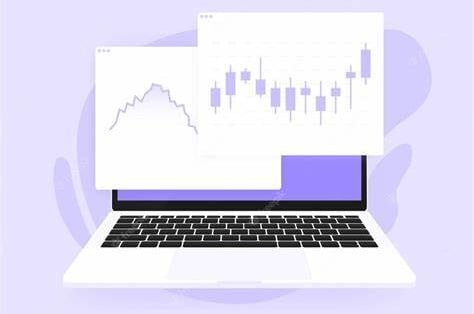

Step 6: Share Allotment Happens
After the IPO closes, shares are allotted. If demand is higher than supply (oversubscription), not all investors receive shares. Refunds are processed, and successful bidders get their shares in their demat account.


Step 7: Listing on the Stock Exchange
On the official listing day, the company’s shares begin trading on the stock exchange (like NSE or BSE). From here, prices are determined by public buying and selling.
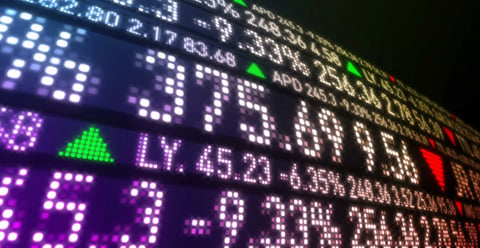

Every IPO you see in the news represents months of planning, paperwork, and promotion. Now you know exactly what goes on behind the scenes — from private boardrooms to public markets.
📄 What Is a Demat Account & Why You Need One to Invest in Stocks?
If you're thinking about investing in the stock market, there's one thing you absolutely need — a Demat account.
But wait — what's a Demat account, and why is everyone talking about it?
Let’s break it down in a super simple way, step-by-step, so even if you’ve never bought a single stock before, you’ll get it.
Step 1: What is a Demat Account?
“Demat” stands for Dematerialized.
It’s basically a digital locker that holds your shares and other securities electronically — no paper certificates, no mess.
When you buy shares of a company, they get stored in your Demat account. When you sell them, they get deducted. Simple as that.
👉 Think of it like a savings account — but instead of money, it holds your investments.


Step 2: Why Do You Need One?
You cannot buy or sell shares on the stock market in India without a Demat account.
Here’s what it allows you to do:
Store shares securely in digital format
Access and manage your portfolio anytime
Receive bonuses, dividends, and rights issues directly
Avoid risks of loss, theft, or damage of paper shares
Step 3: Demat vs Trading Account – What’s the Difference?
People often get confused between these two. Here’s how it works:
Demat Account → Holds your shares
Trading Account → Used to buy/sell those shares on the stock exchange
Bank Account → Moves the money in and out
👉 You need all three linked to start investing.
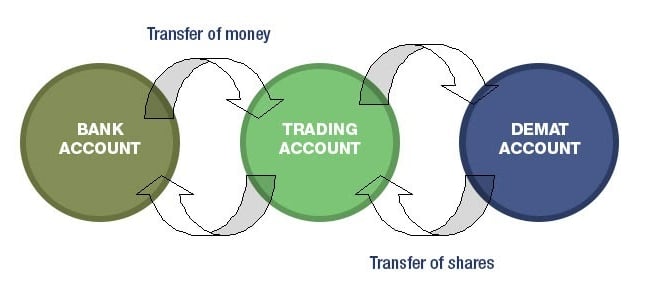

Step 4: Who Provides Demat Accounts?
Demat accounts are offered by Depository Participants (DPs) — these are brokers and banks registered with NSDL or CDSL, the two main depositories in India.
Popular DPs include:
Zerodha
Groww ➡️
Angel One
ICICI Direct
HDFC Securities.


Stock Market Learning
Explore essential techniques and information for mastering stock market basics to advanced strategies.
Beginner Stock Insights


Learn fundamental concepts to confidently start your journey in stock market investing.




Advanced Trading Strategies
Discover advanced techniques to enhance your trading skills and maximize investment potential.
Market Analysis Tools
Utilize tools for effective analysis and informed decision-making in stock trading.


Stock market education